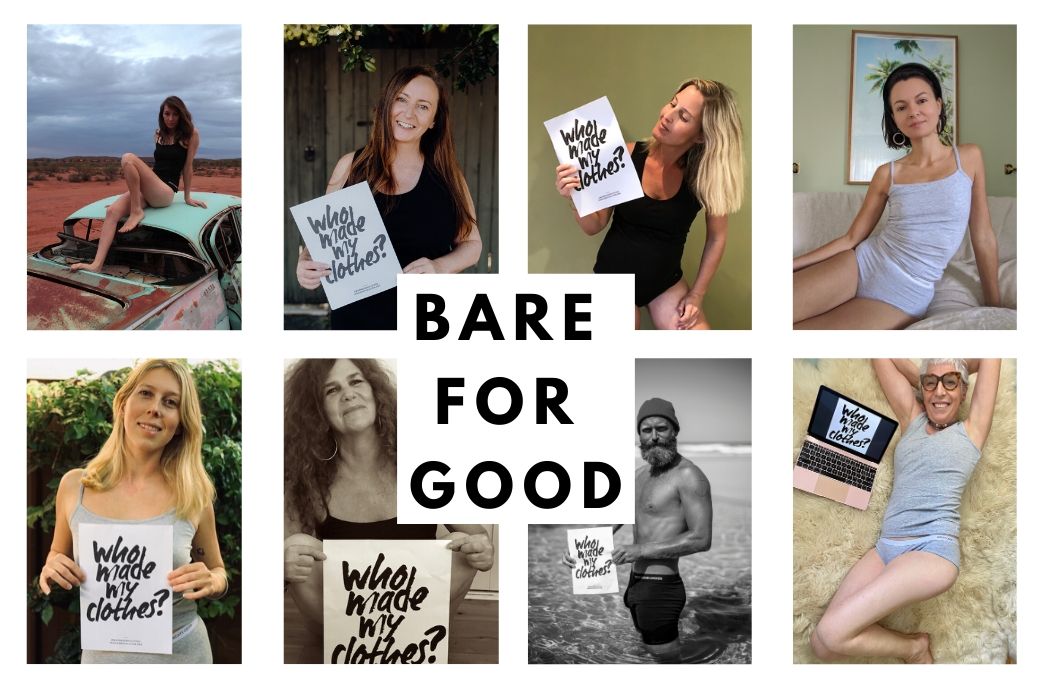BARE FOR GOOD: USING CONSCIOUS FASHION TO BRING TO LIGHT THE STRUGGLES OF GARMENT WORKERS IN THE COVID‐19 CRISIS
Amidst the global economic fallout of the Covid‐19 crisis, the fashion industry, like many others, is reeling, i, ii, iii and the workers at its’ core are suffering dire consequences. Globally, the mass withdrawal of brands from manufacturing commitments and production contracts is leaving garment factories in developing countries high and dry.
Often facing compounding factors of existing disadvantage (food insecurity, poverty, lack of healthcare), the workers in these factories represent some of the most vulnerable populations around the world, who are likely to experience the most devastating impacts of COVID-19 (highlighted by aid agencies and researchers)iii.
Alexandra Turner, Advocacy Coordinator for Baptist World Aid Australia says: “As we reflect on what the past decade has looked like for ethical fashion, it would be remiss not to acknowledge the impact that the COVID-19 crisis will undoubtedly have in shaping the next. As we look to a new decade, what started as a health crisis has unfolded into a humanitarian and economic disaster with the potential to undo years of progress and advocacy. In this moment, the vision we have been striving for has never been more relevant.”
As the pandemic sends shockwaves through these communities, ethically produced Aussie brand Mighty Good Basics is not shying away from the challenge of ensuring these ramifications are part of the economic and humanitarian conversations about the global COVID-19 response. Through their annual Bare for Good campaign, Mighty Good hopes to bring prominence to Fashion Revolution Week which marks the anniversary of the Rana Plaza disaster and highlights the positive change being made across the fashion industry. In light of the impacts of coronavirus, Mighty Good believes this campaign is as striking and significant as ever.
Bare for Good calls on people from all walks of life activists, influencers, leaders, athletes and everyday consumers – to ‘bare it all’ to highlight the importance of ethical manufacturing practices. This is especially important in the current climate of uncertainty and disruption to the manufacturing sector. Participants are encouraged to bare themselves in a photo wearing Mighty Good underwear using #whomademyclothes and #bareforgood to raise awareness.
Mighty Good Basics Director, David Wommelsdorff says: “Now, more than ever, the world needs to support its most vulnerable members of society. We are so proud of this years’ Bare for Good participants, who are showcasing that we can all be changemakers in our own way. We hope other brands can utilise this challenging time to redefine business models and build a more sustainable fashion future.”
This year, the campaign spotlights nine people who are actively doing ‘good’ in their respective fields and in the world: Ronni Khan (OzHarvest), Anika Molesworth (Farmers for Climate Action), Kelley Sheenan (Founder
Peppermint Magazine), Natalie Isaacs (Founder 1 Million Women), Josh Kirkman (Environmentalist and Bodyboarder),
Amy Molloy (Author and Mental Health Advocate), Paulie Georges, (Activist, Ethical Fashion Designer) and
Bronte Hogarth (Environmentalist and Ethical Beauty Founder).
Past participants include; Tara Moss, Ollie Henderson, Laura Wells, Ellia Green, Tim Silverwood and Rachel Rutt.
ENDS.
ABOUT MIGHTY GOOD BASICS
Mighty Good Basics (MG/B) is an ethical and sustainable underwear brand, disrupting the conventional and chemical-laden underwear industry by offering premium, certified fair-trade cotton apparel, for every body. MG/B products carry two certification symbols, one from the Fairtrade Labeling Organisation (FLO) and the other from Global Organic Textiles System (GOTS). Together these are considered the gold star of ethical garment production, demonstrated by MG/B receiving an A+ rating in the Baptist World Aid Report for the last three consecutive years. This makes MG/B one of only a handful of brands globally to demonstrate it pays living wages across the entire supply chain.
i Brooke Roberts-‐Islam, Forbes 30 March 2020
II Annie Kelley, The Guardian 19 March 2020
iii CARE International (March 2020)


